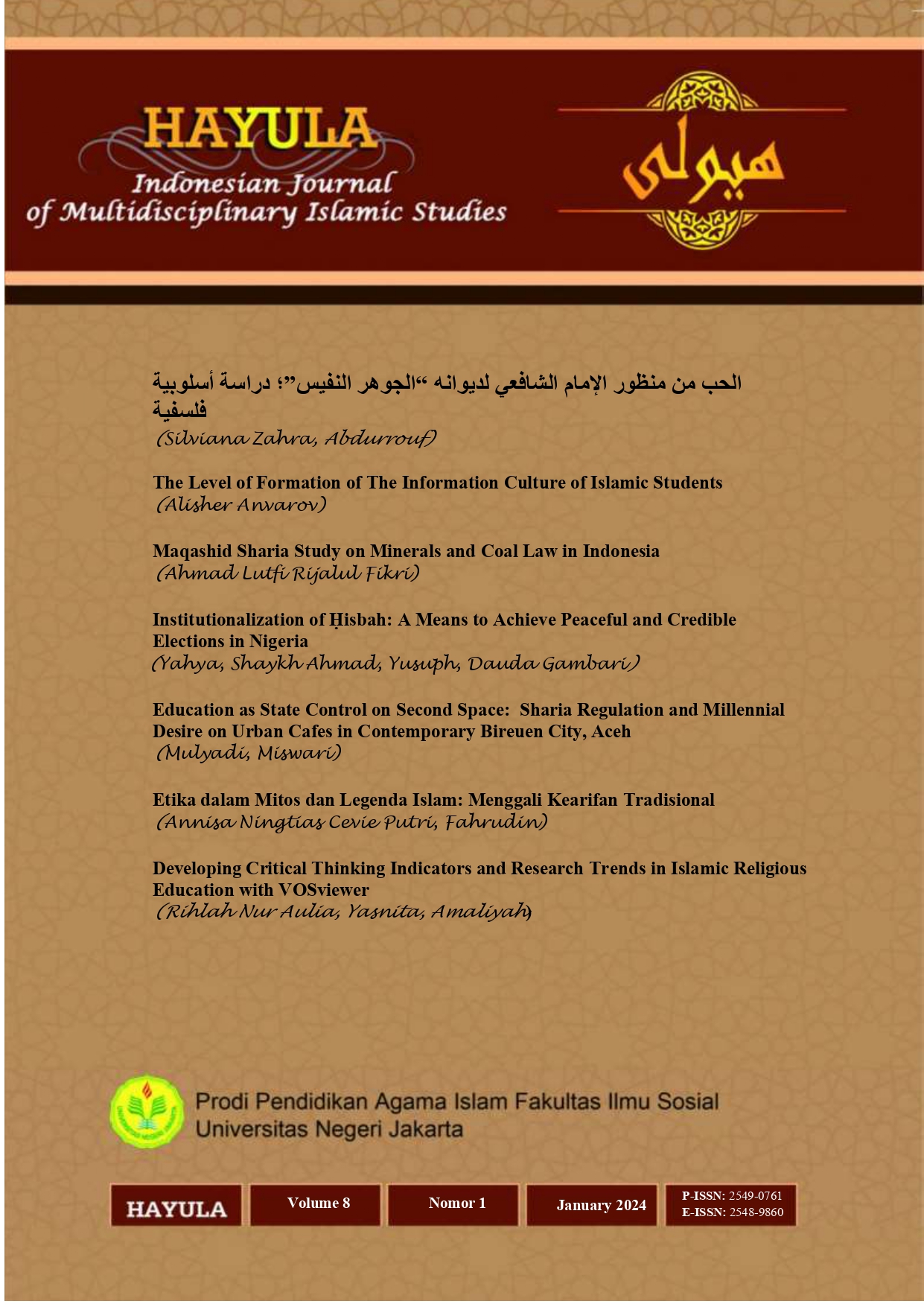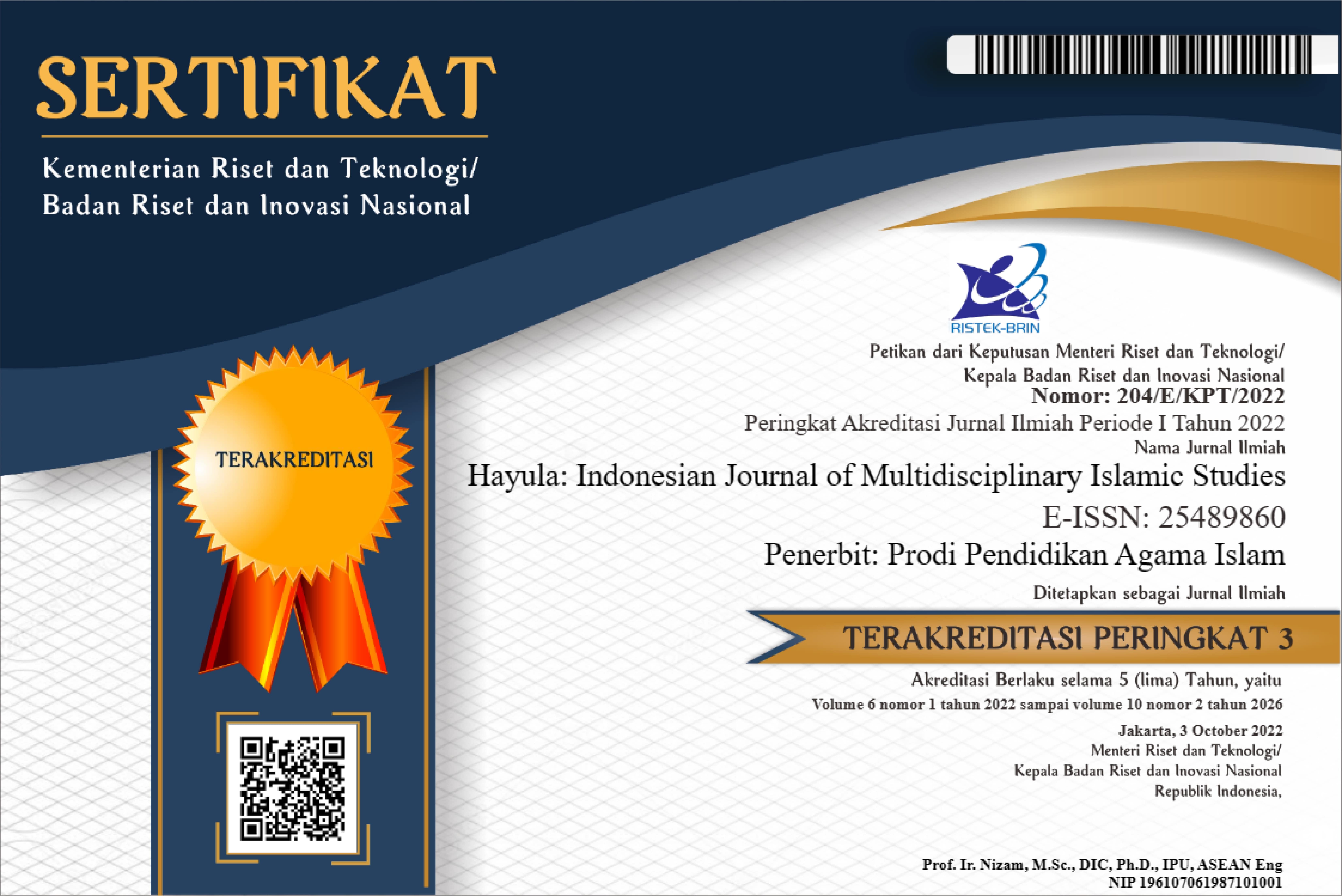The Value of Religious Moderation in Compulsory Wills to Non-Muslims Through the Application of Maqasid Shari'ah
DOI:
https://doi.org/10.21009/hayula.009.01.03Keywords:
Compulsory wilss, Non-muslims, Maqasid al-syari'ah, ModerationAbstract
This research examined decision number 263/P.Dt.G/2007/Pta.Sby to identify the values of religious moderation implemented by the judge. This research aims to find out and analyze the values of religious moderation in the granting of mandatory wills to non-Muslims through the application of maqasid al-syari'ah in decision number 263/P.Dt.G/2007/Pta.Sby. The source of information regarding this matter is decision number 263/p.dt.g/2007/pta.sby. The decision was analyzed using content analysis. The steps taken are collecting data, organizing it, presenting it in writing, and drawing conclusions. The research findings show that the value of religious moderation implemented by religious court judges in the decision above, have a positive impact includes: maintaining peace and stability in the family environment, promoting peace and prosperity in society, ensuring the protection of property, providing protection for religious interests, protecting the existence of family harmony, and ensuring social justice in the community, and reflecting the flexibility of Islamic teachings.
References
Abror, M. (2020). Religious Moderation in the Frame of Tolerance: Religious Moderation in the Frame of Tolerance. Rusydiah: Journal of Islamic Thought, 1(2), 143-155.
Albayrak, I. (2022). Legal Flexibility and Moderation in Islamic Jurisprudence. International Journal of Islamic Law, 14(1), 65-78.
Ash-Shahbuni, M. A. (1995). The Division of Inheritance According to Islam, translated by A.M.Basalamah. cet.1, p.157.
B.S., D. A., & Hariyati, T. (2020). Problematics of Compulsory Wills Against Heirs of Different Religions in Indonesia. Cepalo, 4(2), 157-170. https://doi.org/10.25041/cepalo.v4no2.1893
Bula, D. F., Dungga, W. A., & Sarson, M. T. Z. (2023). Juridical Analysis of Inheritance of Adopted Children in View of the Compilation of Islamic Law and Civil Law. Aufklarung: Journal of Education, Social and Humanities, 3(1), 42-55.
Darmayanti, D., & Maudin, M. (2021). The Importance of Understanding and Implementing Religious Moderation in the Life of the Millennial Generation. Syattar, 2(1), 40-51.
Dongoran, M. (2022). Implementation of Endeng-Endeng Tradition at Walimatul'Urs Event in North Padang Lawas Regency in the Perspective of Maqashid Shari'ah. State Islamic University of North Sumatra Medan.
Fikri, M. R., Supriyanto, E., & Sihotang, M. (2023). Juridical Review of the Inheritance Rights of Adopted Children According to Khi (Compilation of Islamic Law) and Kuhperdata (Comparative Study). Yure Humano, 7(1), 37-57. https://mputantular.ac.id/ojshukum/index.php/yurehumano/article/view/155
Gita Sartika, D., Lestari, A., Hayati, P., Bila Khotrun Nada, S., & Wismanto, W. (2024). Analysis of Educational Values in the Context of Becoming a Professional Educator. Student Research Journal, 2(2), 30-38. https://doi.org/10.55606/srjyappi.v2i2.1128
HARIDI, H. A. R. (2019). Judges' Thinking in Cases of Inheritance of Different Religions (Study of Supreme Court Decisions). http://repository.radenintan.ac.id/7100/
Hassan, A., & Osman, M. N. (2019). Islamic Moderation (Wasatiyyah) in the Context of Maqasid al-Shariah: A Conceptual Analysis. Journal of Islamic Thought and Civilization, 9(2), 45-60.
Herenawati, K., Sujana, I. N., Kusuma, H., & Made, I. (2020). The Position of Inheritance Property from Non-Muslim Heirs and the Application of Wasiat Wajibah for Non-Muslim Heirs (Analysis of the Determination of the Badung Religious Court Number: 4/Pdt. P/2013/PA. Bdg Dated March 7, 2013). DiH: Journal of Legal Science, 16(1), 372219.
Hula, I. R. N. (2020). Tafsir Tarbawi: Analysis of Qur'anic Language and Literature in Surah Luqman. AL-Jauhari Scientific Journal: Journal of Islamic and Interdisciplinary Studies, 5(1), 121-146.
Iqbal, M. N., Arfa, F. A., & Waqqosh, A. (2023). The Purpose of Islamic Law in the Perspective of Maqashid Sharia. Journal of Education and Counseling (JPDK), 5(1), 4887-4895.
Kamali, M. H. (2010). Moderation and Balance in Islam: The Quranic Principle of Wasatiyyah. Islamic Texts Society.
Kamarudin. (2015). Application of mandatory will for non-Muslim heirs (Case study No.16K/AG/2010). MIZANI: Legal, Economic and Religious Discourse, 25(2), 1-28.
Khalisha, N., & Zubaedah, R. (2021). Provisions for the Delivery of Compulsory Wills to Heirs of Different Religions in Court and Judges' Considerations in the Decision of the Bekasi Religious Court Number 0024 / Pdt . P / 2016 / PA . Bks. El-Faqih: Journal of Islamic Thought and Law, 7(2), 1-24.
Lamido, A. A. (2016). Maqasid al-Shari'ah as a Framework for Economic Development Theorization. International Journal of Islamic Economics and Finance Studies, 2(1), 27-49. https://doi.org/10.12816/0036594
Lestari, S. D. W. I. (2022). Community Vaccination Program In Tandun Sub-District Based On The Regulation Of The Minister Of Health Of The Republic Of Indonesia Number 10 Of 2021 Concerning The Implementation Of Vaccination In The Context Of Overcoming Covid-19 From The Perspective Of Fiqh Siyasah. Sultan Syarif Kasim Riau State Islamic University.
Ma'arif, S. (n.d.). RELIGIOUS MODERATION AND THE ROLE OF EDUCATION IN FOSTERING INTER-RELIGIOUS TOLERANCE IN ISLAM.
Mingka, I. N. (2019). Legal study of the position of li'an children in obtaining their rights as children. Muhammadiyah University of North Sumatra, 23.
Mohammad Hadi Sucipto, & Khotib. (2020). The Maslahah Mursalah Debate in the Books of Al-Imam Al-Ghazali. El-Faqih: Journal of Islamic Thought and Law, 6(1), 1-17. https://doi.org/10.29062/faqih.v6i1.106
Mu'alim, A. N. (2022). Portrait of Maqasid Sharia from the Perspective of Abu Hamid Muhammad Bin Muhammad Al-Ghazali At-Thusi As-Syafi'i. Al-Mawarid Journal of Sharia and Law (JSYH), 4(2), 111-120.
Muhammad Daud, Z. F., & Hj Azahari, R. (2018). Amalan Penghakiman Dalam Kes Wasiat Wajibah Kepada Waris Berbeza Agama: A Selected Case Study. Jurnal Syariah, 26(2), 267-294. https://doi.org/10.22452/js.vol26no2.4
Noviyanti, L., & Mulati, M. (2019). The Application of Compulsory Wills to Non-Muslims in Review of the Compilation of Islamic Law (Khi) Case Study of Supreme Court Decision No. 331/K/AG/2018/MA. Adigama Law Journal, 2(2), 267-295.
Pamilangan, B. (2022). Implications of Interfaith Marriage in the Perspective of Islamic Law in South Sangalla District, Tana Toraja Regency. 160.
Paryadi, P. (2021). Maqashid Syariah: Definition and Opinions of Scholars. Cross-Border, 4(2), 201-216.
Pratiwi, L. P. P. I., Mangku, D. G. S., & Yuliartini, N. P. R. (2020). Regulations on the Position of Children Outside of Marriage After the Constitutional Court Decision Number 46/Puu-Viii/2010. Yustisia Community Journal, 3(1), 13-24. https://ejournal.undiksha.ac.id/index.php/jatayu/article/view/28831
Prayitno, N. H., & Nursikin, M. (2023). Wasathiyyah Islam as Character Education. Affection: Journal of Educational Research and Evaluation, 4(6), 685-692.
Qiana, A. (2020). Implementation of Maqasid al-Syari'ah in the Settlement of Inheritance Disputes. Journal of Indonesian Islamic Law, 7(1), 93-109.
Rahman, F., & Mustafa, M. (2021). The Application of Maqasid al-Shariah in Contemporary Muslim Societies. Journal of Islamic Studies and Culture, 9(1), 20-35.
Ratna Pura, N., Agus Putra, P. A., & Rohmah Maulida, I. S. (2022). Analysis of Maslahah Mursalah According to Imam Al-Ghazali on Government Regulation No. 36 of 2021 concerning Wages. Bandung Conference Series: Sharia Economic Law, 2(2), 43-49. https://doi.org/10.29313/bcssel.v2i2.2655
Rina, M. (2018). Religious Moderation and Justice in Islamic Family Law. Journal of Sharia Science, 10(1), 57-75.
Rinaldi, M., Badan, A., Pajak, P., Daerah, R., Medan, K., Kunci, K., Waris, A., Agama, B., Wajibah, W., & Belakang, A. L. (2017). Granting Wasiat Wajibah to the Heirs of Different Religions. DE LEGA LATA: Journal of Legal Science, 2(2), 351-372. https://jurnal.umsu.ac.id/index.php/delegalata/article/view/1161
Salma, S. (n.d.). Implementation of the Duties and Obligations of Judges at the Manado Religious Court (Analysis of the Prophetic Hadith Perspective). Publication. http://repository.iain-manado.ac.id/id/eprint/93%0Ahttp://repository.iain-manado.ac.id/93/1/Penelitian Implementation of Duties and Obligations 2009 %281%29.pdf
Sari, A. K., Siregar, A. R. H., Suratna, A. A., Safitri, D., Nugraha, F. M. A., Harahap, E. W., & Fahri, M. I. (2021). Religious Moderation in Maintaining Community Cultural Diversity during the Covid-19 Pandemic. Aptekmas Journal of Community Service, 4(4), 91-95.
Sari, N. (2021). Application of Maqasid al-Syari'ah Principles in Religious Court Decisions. Journal of Islamic Family Law, 6(1), 45-62.
Syarief, O. A. (2021). The Authority of Religious Court Judges in Establishing Compulsory Wills for Heirs Who Do Not Establish Wills. Tahkim, 17(2), 209-226.
Willy, G. (2023). Labor Protection In Perpu Number 2 Of 2022 On Job Creation In Terms Of Maqashid Sharia Perspective. Uin Raden Intan Lampung.
Winata, K. A., Solihin, I., Ruswandi, U., & Erihadiana, M. (2020). Islamic Moderation in Islamic Education Learning through Contextual Learning Model. Ciencias: Journal of Educational Research and Development, 3(2), 82-92.
Downloads
Published
How to Cite
Issue
Section
License
Copyright (c) 2025 Agustiar (Author)

This work is licensed under a Creative Commons Attribution 4.0 International License.
Authors who publish with this Journal agree to the following terms:
- Author retain copyright and grant the journal right of first publication with the work simultaneously licensed under a creative commons attribution licensethat allow others to share the work within an acknowledgement of the work’s authorship and initial publication of this journal.
- Authors are able to enter into separate, additional contractual arrangementfor the non-exclusive distribution of the journal’s published version of the work (e.g. acknowledgement of its initial publication in this journal).
- Authors are permitted and encouraged to post their work online(e.g. in institutional repositories or on their websites) prior to and during the submission process, as it can lead to productive exchanges, as well as earlier and greater citation of published works.
Users/public use of this website will be licensed to CC BY







